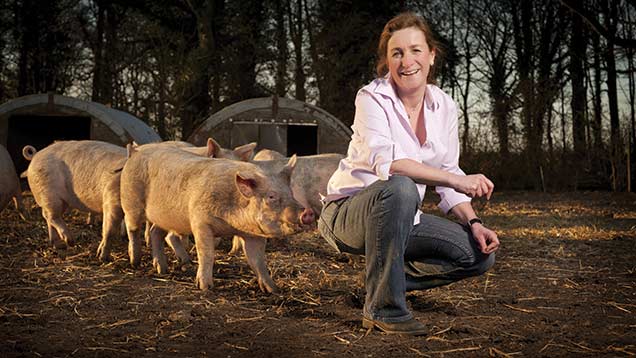Opinion: Customers want the genuine article – so let’s sell it to them
 Sally Jackson ©Jim Varney
Sally Jackson ©Jim Varney It’s all about marketing. We market our businesses, our products and, most importantly, ourselves.
Business marketing is fairly straightforward. Each company should have an ethos and an image that they want to present to the world and, if an international firm, a logo or colour scheme immediately recognisable in any language.
John Deere has green and yellow with a deer; Massey its red and triangles.
These two manufacturers, in particular, spark many discussions between farmers’ offspring in the school playground regarding the best colour for a tractor. The shade becomes embedded in our minds, almost from birth.
A friend of my son’s held a 21st with a John Deere theme. Point made. He then took a job with his hero company.
Tractor makers are great at discussing a deal although, of course, the list price is never the sale price.
This happens everywhere – the endless sales at sofa warehouses (which Monday is “must-end Monday”, exactly?); the two-for-one offers, probably funded by the suppliers under the thumbscrew tactics of the supermarkets; the electrical deals where products held at an artificially high price suddenly drop back down to become a “bargain”.
We still find discounts hard to resist.
Andrew met two disgruntled farmers who had asked for a branded jacket after buying some big kit. No deal.
They had seen a recent TV programme about a customised luxury car, in which the emphasis was not only providing the buyer with exactly what they wanted, but also on perfecting the extra “present” that they gave the delighted purchaser.
A coat costs little, advertises the brand, and makes the farmer feel great. The “marketing” that really makes a difference happens after the sale, is ongoing and long-term.
Some of the customers that I see now in the farm shop are the six-year-olds who came in when we first opened. They are bringing their children in to buy food and play.
This not only makes me feel really, really old, but reminds me we, too, need to play the long-term marketing game.
Waitrose is doing this really well by offering a free tea or coffee every day if you are a loyalty card holder. My eldest daughter Anna, living in Oxford, picks up a free cup of tea each morning.
I asked her if she bought anything else there. She immediately said no – then corrected herself, admitting to the odd packet of biscuits or sandwich.
She added that she went into M&S food hall the other day and thought it a bit downmarket.
Her sister immediately accused her of abandoning her solid northern roots, but Anna insisted that she now had an appreciation of attractive (and expensive) mass retailing.
She is a commercial photographer on about £17,000/year who cannot afford to shop in Waitrose at all. However, until she becomes the next Annie Leibovitz, whose photos sell for thousands of pounds, Morrisons it is.
Waitrose, meanwhile, is grooming her as a future customer, just in case. We need this approach in farming if we want to be producing British milk, beef, lamb, eggs, chicken and so forth, and feeding ourselves into the next century.
The same long-term view should apply to tractor dealers, too. A couple of years ago the current husband bought a tractor, albeit a second-hand one.
Nice and shiny it looks, too.
Tractors do not come cheap, and amazingly their prices seem to move with the grain price (oh cynical me).
I asked the dealer whether, on the back of the deal, they would like to supply us with a few ride-on tractors for our farm park. We would paint the area in the brand’s colours and put up a sign advertising their business.
The rep did, to be fair, offer them to me at a slight discount and gave me a banner.
But I can’t help feeling that, with more than 40,000 visitors to the farm park this year, he may have missed a trick.
We market ourselves every day by how we dress and how we act. The youngest is heading off to uni sporting a new haircut and she is concerned at giving the right impression from the start.
Facebook groups play a huge part of pre-uni communication between new housemates and photos inevitably reflect your character.
We always look at a Facebook page when employing young people. We look past the sometimes alcohol-induced photos and ridiculous fancy dress and try to get a view of the person behind the parties.
The “face” of the Pink Pig Farm is me and, although I dress in jeans (one of the main reasons I set up my own business!), I hope that I portray the honesty, integrity and love of good food and fun that our brand stands for.
Supermarket marketing is as amazing as it is amazingly misleading. Some make a big fuss about “their” farms when in reality these can only provide a tiny percentage of goods direct.
Others show photos of farmers’ markets and free-range animals, when artisan food producers in such bucolic settings account for the minority of their suppliers.
Farmers, farm shops and farmers markets have a huge opportunity to promote their products as genuine. Because that’s exactly what they are.
Sally Jackson and husband Andrew farm 364ha just outside Scunthorpe in north Lincolnshire. They have a farm shop, The Pink Pig Farm (a former winner in the diversification category of the Farmers Weekly Awards), with a 90-seater café and farm trail. Sally is chairman of the Farmers’ Retail and Markets Association (Farma).
